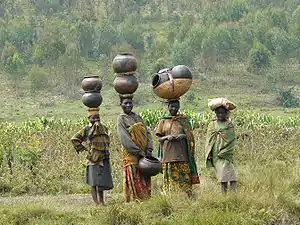Women in Burundi
Following the recommendations of a Universal Periodic Review (UPR) in 2008, Burundi ratified the International Convention for the Protection of All Persons from Enforced Disappearance (ICCPED),[1] Optional Protocol to the Convention on the Elimination of All Forms of Discrimination against Women[2] (OP-CEDAW), and the Optional Protocol to the Convention against Torture and other Cruel, Inhuman or Degrading Treatment or Punishment[3] (OPCAT).

However, Women in Burundi are vastly underrepresented at all levels of decision making in the government.[4]
The phenomenon of sexual violence, particularly against women and children, is common in the country.[4] The Initiative for Peacebuilding noted in a 2010 study on gender issues in Burundi that there is a strong correlation between areas of intense military activity and high incidences of sexual violence.[5]
Burundian Civil War
Amnesty International claims rape, in addition to physical mutilation, was used during the Burundian Civil War as 'a strategy of war'.[5] In 2004 the Hutu rebel group, Forces of National Liberation (FNL), claimed responsibility for killing 160 Congolese Tutsi refugees in a United Nations camp at Gatumba near the Congo border in Burundi. The attack was strongly condemned by the U.N. Security Council, which issued a statement of outrage at the fact that "most of the victims were women, children and babies who were shot dead and burned in their shelters."[6]
Burundi women's national football team
Lydia Nsekera, president of the Football Federation of Burundi[7]
The Football Federation of Burundi, the country's national association, created a woman's football programme in 2000.[8][9][10] By 2006, there were just 455 registered women players, and the absence of a thriving women's game has been an obstacle for the national team.[11] Lydia Nsekera is the head of the national football association.[12]
Outside the national federation, the Commission nationale du football féminin was established by the 1990s, and a league and women's teams were organised in the same period in Bujumbura.[13][14]
Notable figures
Sylvie Kinigi - Prime Minister and acting President of Burundi.[15]
References
- United Nations. "United Nations Treaty Collection: Chapter IV: Human Rights: 16. International Convention for the Protection of All Persons from Enforced Disappearance. New York, 20 December 2006". Retrieved 2012-08-29.
- United Nations. "United Nations Treaty Collection: Chapter IV: Human Rights: 8. Convention on the Elimination of All Forms of Discrimination against Women. New York, 18 December 1979". Archived from the original on 23 August 2012. Retrieved 2012-08-29.
- United Nations. "United Nations Treaty Collection: Chapter IV: Human Rights: 9. Convention against Torture and Other Cruel, Inhuman or Degrading Treatment or Punishment. New York, 10 December 1984". Archived from the original on 8 November 2010. Retrieved 2012-08-29.
- http://lib.ohchr.org/HRBodies/UPR/Documents/Session3/BI/A_HRC_WG6_3_BDI_1_Burundi_E.pdf
- "Countries".
- "U.N. Demands Justice After Massacre of 150 Refugees in Burundi". The New York Times. 2004-08-16. Retrieved 2009-06-29.
- Olajire, Ademola (November 5, 2006). "Vanguard (Nigeria) - AAGM: Wesley Canvasses Greater Support for Women Football". Vanguard. Lagos, Nigeria. Retrieved 16 April 2012.
- "Burundi: Fixtures and Results". FIFA. 2012. Retrieved 28 June 2012.
- "Goal! Football: Burundi" (PDF). FIFA. 21 April 2009. p. 4. Retrieved 16 April 2012.
- Tom Dunmore (16 September 2011). Historical Dictionary of Soccer. Scarecrow Press. ISBN 978-0-8108-7188-5. Retrieved 13 April 2012.
- FIFA (2006). "Women's Football Today" (PDF): 40. Retrieved 17 April 2012. Cite journal requires
|journal=(help) - Gabriel Kuhn (24 February 2011). Soccer Vs. the State: Tackling Football and Radical Politics. PM Press. p. 34. ISBN 978-1-60486-053-5. Retrieved 13 April 2012.
- "Burundi - Lydia Nsekera, la "Madame Thatcher du football" à la Fifa" (in French). Slate Afrique. 31 May 2012. Retrieved 28 June 2012.
Elle a beaucoup œuvré pour inciter les femmes du Burundi à pratiquer ce sport. Dans les années 1990, en tant que présidente de la Commission nationale du football féminin, elle a mis en place des équipes féminines à Bujumbara et a créé un championnat de football uniquement dédié aux femmes.
- "Fifa : Lydia Nsekera, première dame du foot mondial". Jeune Afrique (in French). 30 May 2012. Retrieved 28 June 2012.
Elle a assouvi sa passion par procuration et contribué largement à changer les choses en créant des équipes féminines à Bujumbura, la capitale de cette ancienne colonie belge. À la fin des années 1990, la Fifa, pour encourager le développement du football au Burundi, se tourne naturellement vers Lydia Nsekera.
- 1936-, Skard, Torild (2014). Women of power : half a century of female presidents and prime ministers worldwide. Bristol: Policy Press. ISBN 9781447315780. OCLC 880196349.CS1 maint: numeric names: authors list (link)